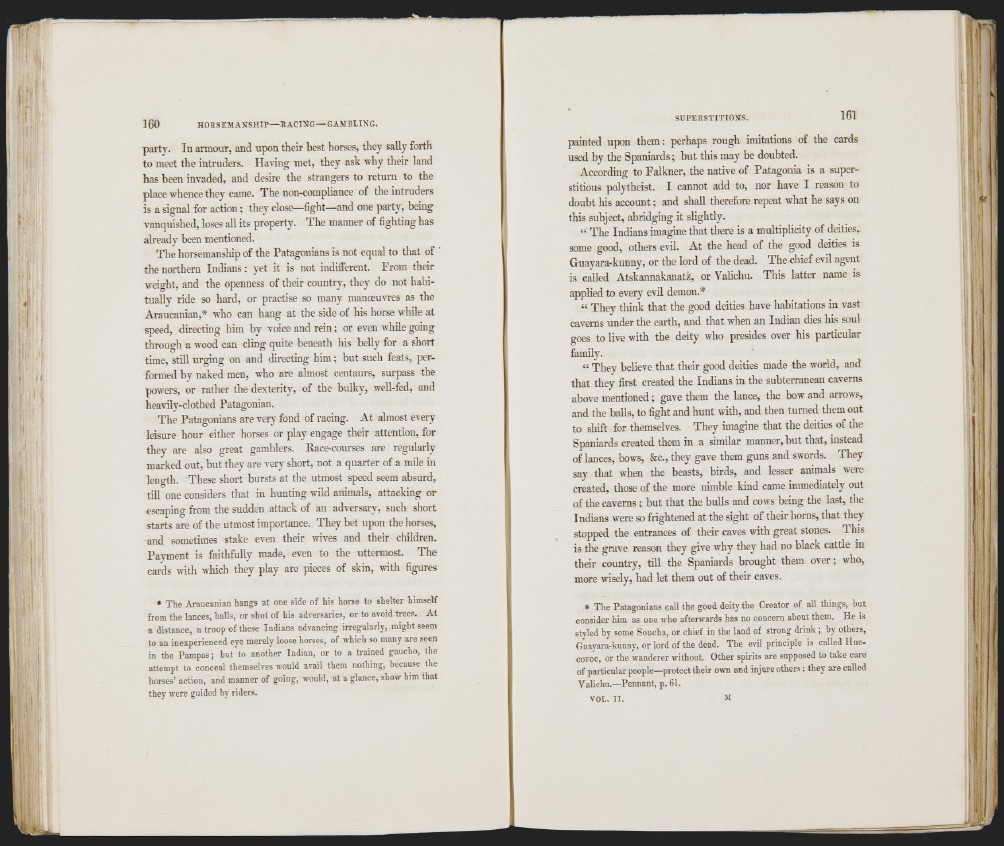
160 HORSEMANSHIP RACING— GAMBLING.
party. In armour, and upon their best horses, they sally forth
to meet the intruders. Having met, they ask why their land
has been invaded, and desire the strangers to return to the
place whence they came. The non-compliance of the intruders
is a signal for action ; they close—fight—and one party, being
vanquished, loses all its property. The manner of fighting has
already been mentioned.
The horsemanship of the Patagonians is not equal to that of '
the northern Indians : yet it is not indifferent. Prom their
weight, and the openness of their country, they do not habitually
ride so hard, or practise so many manoeuvres as the
Araucanian,* who can hang at the side of his horse while at
speed, directing him by voice and rein ; or even while going
through a wood can chng quite beneath his belly for a short
time, still urging on and directing him ; but such feats, performed
by naked men, who are almost centaurs, surpass the
powers, or rather the dexterity, of the bulky, well-fed, and
heavüy-clothed Patagonian.
The Patagonians are very fond of racing. At almost every
leisure hour either horses or play engage their attention, for
they are also great gamblers. Race-courses are regularly
marked out, but they are very short, not a quarter of a mile in
length. These short bursts at the utmost speed seem absurd,
till one considers that in hunting wild animals, attacking or
escaping from the sudden attack of an adversary, such short
starts are of the utmost importance. They bet upon the horses,
and sometimes stake even their wives and their children.
Payment is faithfully made, even to the uttermost. The
cards with which they play are pieces of skin, with figures
* The Araucanian hangs at one side of his horse to shelter himself
from the lances, halls, or shot of his adversaries, or to avoid trees. At
a distance, a troop of these Indians advancing irregularly, might seem
to an inexperienced eye merely loose horses, of which so many are seen
in the Pampas; hut to another Indian, or to a trained gaucho, the
attempt to conceal themselves would avail them nothing, hecause the
horses’ action, and manner of going, would, at a glance, show him that
they were guided by riders.
I
SUPERSTITIONS. 161
pcointed upon them: perhaps rough imitations of the cards
used by the Spaniards; but this may be doubted.
According to Falkner, the native of Patagonia is a superstitious
polytheist. I cannot add to, nor have I reason to
doubt his account; and shall therefore repeat what he says on
this subject, abridging it slightly.
“ The Indians imagine that there is a multiplicity of deities,
some good, others evü. At the head of the good deities is
Guayara-kunny, or the lord of the dead. The chief evil agent
is called Atskannakauatz, or Vahchu. This latter name is
applied to every evil demon.*
“ They think that the good deities have habitations in vast
caverns under the earth, and that when an Indian dies his soul
goes to live with the deity who presides over his particular
femily.
“ They believe that their good deities made the world, and
that they first created the Indians in the subterranean caverns
above mentioned; gave them the lance, the bow and arrows,
and the balls, to fight and hunt with, and then turned them out
to shift for themselves. They imagine that the deities of the
Spaniards created them in a similar manner, but that, instead
of lances, hows, &c., they gave them guns and swords. They
say that when the beasts, birds, and lesser animals were
created, those of the more nimble kind came immediately out
of the caverns ; but that the bulls and cows being the last, the
Indians were so frightened at the sight of their horns, that they
stopped the entrances of their caves with great stones. This
is the grave reason they give why they had no black cattle in
their country, till the Spaniards brought them over; who,
more wisely, had let them out of theft caves.
» The Patagonians call the good deity the Creator of all things, but
consider him as one who afterwards has no concern ahout them. He is
styled hy some Soucha, or chief in the land of strong drink; hy others,
Guayara-kunny, or lord of the dead. The evil principle is called Hue-
covoe, or the wanderer ivithout. Other spirits are supposed to take care
of particular people—protect their mvn and injure others: they are called
Valichú.—Pennant, p. 61.
VOL. II . M
ji
MU'